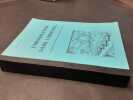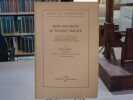-
Type
Autograph (1)
Book (53255)
Magazine (287)
Manuscript (2)
Maps (1)
New book (1)
Old papers (1)
Photographs (1)
-
Latest
Last 24h (391)
Last 3 days (42)
Last month (587)
Last week (78)
-
Language
Dutch (2)
English (30)
Finnish (1)
French (53444)
German (15)
Greek (5)
Italian (17)
Japanese (2)
Latin (20)
Polish (1)
Portuguese (2)
Russian (1)
Spanish (7)
Swedish (2)
-
Century
16th (66)
17th (201)
18th (1290)
19th (3692)
20th (22606)
21st (3843)
-
Countries
Belgium (6751)
Brazil (28)
Canada (6)
China (2)
Côte d'Ivoire (63)
Denmark (1017)
France (40798)
Germany (4)
Greece (3)
Italy (54)
Netherlands (281)
Switzerland (4541)
United States of America (1)
-
Syndicate
ALAC (6)
CLAM (5)
CNE (6)
ILAB (22159)
NVVA (1045)
SLACES (953)
SLAM (19837)
SNCAO (41)
L'Imagination dans l'histoire
Chez l’auteur 1986 In-8 broché 20,6 cm sur 14,6. 219 pages. Bon état d’occasion.
Bon état d’occasion
Matérialisme et critique du fétichisme dans le marxisme. Un exemple : le problème de l'état. Thèse pour l'obtention du Doctorat de troisième cycle en philosophie.
Strasboug, chez l'auteur et Université des Sciences Humaines de Strasbourg - U.E.R. de Philosophie, fort in-4, cartonnage souple avec dos en toile brune muette éd., 476 - (1) - VIII pp., photocopie imprimée sur une seule face, bibliographie + une Lettre de l'auteur manuscrite et signée à Kyril Ryjik (écrivain et sinologue, auteur de "L'idiot chinois"), table des matuères, Un des RARES exemplaire de la thèse de l'auteur qu'il défend en 1979. Depuis les années 1970 je poursuis une réflexion dans le domaine de la théorie générale de la société, ma principale source d’inspiration étant la sociopsychanalyse (complétée ensuite par l'éthologie des primates et quelques notions de neurologie), dans une optique que l’on pourrait appeler post-marxiste. En lien avec cette recherche, je réfléchis également à ce qu’est l’action politique, dans une problématique qu’on appelle en Europe " l’alternative ". Je milite principalement dans le mouvement altermondialiste. D’où à la fois la diversité et l’unité des textes que j’ai écrits, qui sont répertoriés ici (ainsi que quelques textes d'autres auteurs).Sur ce site, vous pouvez voir la place qu'occupe telle ou telle question dans la démarche d'ensemble qui est la mienne. Bref, tout ce que vous avez toujours voulu savoir sur le travail de Joël Martine sans jamais oser le lui demander.J'ai été professeur de philosophie en lycée à Strasbourg puis à Marseille. Je suis retraité depuis septembre 2012. Je me définis « professionnellement » comme un artisan de concepts pour et dans les mouvements sociaux.Sur le plan universitaire, j’ai soutenu deux thèses de doctorat en philosophie :en 1980 une thèse de troisième cycle intitulée Matérialisme et critique du fétichisme dans le marxisme, un exemple : la théorie de l’Etat, publiée aux éditions Anthropos sous le titre L’Or, la parole, l’Etat, critique marxiste des fétiches,en 1995 une thèse " nouveau régime " intitulée Ontologie de la société, psychanalyse de la vie sociale, publiée en 1997 aux PUF dans la collection Sociologie d’aujourd’hui, et dont le résumé est accessible sur ce site dans la rubrique Sociopsychanalyse. RARE. Très bon état du papier; la couverture présente quelques salissures, une pliure de la 4e de couverture et une petite déchirure sur la première de couverture.
DELIT ET FUITE ETRE LIBRE.
SEUIL. 1997. In-8. Broché. Bon état, Couv. convenable, Dos satisfaisant, Intérieur frais. 119 pages - 1er plat illustré en couleurs.. . . . Classification Dewey : 100-PHILOSOPHIE ET DISCIPLINES CONNEXES
Collection Philo. Classification Dewey : 100-PHILOSOPHIE ET DISCIPLINES CONNEXES
Thomas d'Aquin et l'analyse linguistique (Conférence Albert-le-Grand 1963)
Montréal/ Paris, Inst. d'études médiévales/ Vrin 1963 79pp., 20cm., brochure originale, non coupé, bon état, F105731
Plutarchi Chaeronensis De tranquillitate et securitate animi Guillielmo Budaeo interprete. Collana Il Ritorno dei Classici nell’Umanesimo, 3.10, Traduzioni, 10.
Firenze, Sismel, Edizioni del Galluzzo 2019, 240x170mm, XII - 183pagine, in brossura. Nuovo stato.
Pour un paiement via PayPal, veuillez nous en faire la demande et nous vous enverrons une facture PayPal
Trois documents de musique grecque.
Librairie C. Klincksieck Paris 1953 In-8 ( 250 X 165 mm ) de 78 pages, broché sous couverture imprimée. Transcriptions commentées de: 2° hymne delphique à Apollon, Epitaphe de Seikilos ( IIe s. ap. J.C. ) et fragment d'un Choeur d'Oreste d'Euripide. Bel exemplaire.
Platon-Polichinelle ou la sagesse devenue folie, pour se mettre à la portée du siècle. Par un Solitaire auvergnat. Quatrième édition.
Lyon & Paris Lesne & Poussielgue-Rusand 1843 3 parties en un vol. in-12, demi basane, dos lisse orné. (Reliure de l'époque).
Solution de grands problèmes, mise à la portée de tous les esprits.
Lyon & Paris Lesne, Pélagaud & Poussielgue-Rusand 1843-1845 2 vol. in-12, demi basane, dos lisses ornés, fers très lég. différents. (Reliure de l'époque).
Le tome 1 est en édition originale, le tome 2 est en seconde édition. La même préface est reproduite dans les deux tomes.
Phone number : 33 (0)6 77 77 12 33
Platon-Polichinelle, ou la Sagesse devenue Folie pour se mettre à la portée du siècle.Troisième partie : Les Religieux seraient-ils encore bons à quelque chose?Par un Solitaire Auvergnat. Troisième Partie.
Lyon, Pélagaud et Lesne 1840, 165x100mm, VIII- 190pages, reliure demi-basane. Couverture et dos muets. Plats papier marbré. Traces d’humidité, quelques rousseurs. Malheureusement incomplet, il manque la 1ère et la 2e partie. L’ouvrage conserve malgré tout une bonne tenue.
Pour un paiement via PayPal, veuillez nous en faire la demande et nous vous enverrons une facture PayPal
LA LINGUISTIQUE SYNCHRONIQUE. Etudes et recherches
Paris, PUF, SUP, Le Linguiste, 1968, in-12 broché, 246 pp. TRES BON ETAT
Nombreux titres disponibles en Philosophie.
De la perfectibilité humaine.
Paris, Périsse, 1835. in-8, XXpp.-370pp. Relié demi-basane fauve, dos lisse, filets dorés. (Reliure de l'époque).
Édition originale. L'abbé Martinet (né à Queige, Savoie, en 1802) est l'auteur de plusieurs ouvrages contre la politique de son temps. Il signait parfois "Platon-Polichinelle". - Cachets de congrégation sur le titre, rousseurs claires, coiffes élimées.
Logica seu Ars cogitandi [...].
Parisiis [Paris] / Pictavii [Poitiers], apud J. Barbou / Claudium Faix, 1771. Un vol. au format in-12 (171 x 103 mm) de 2 ff. n.fol., viiii pp., 2 ff. n.fol. et 477 pp. Reliure de l'époque de pleine basane marbrée blonde, filet à froid encadrant les plats, dos à nerfs orné de filets gras à froid, doubles caissons d'encadrement dorés, fleurons dorés, semis de pointillés dorés, pièce de titre de maroquin chair, titre doré, palette dorée en queue, filet doré sur les coupes, tranches jaspées.
Quérard V, La France littéraire, p. 589. Angles élimés. Légères altérations superficielles affectant les plats. Quelques feuillets légèrement oxydés. Du reste, très belle condition. Rare.
La philosophie du catéchisme catholique.
P., Lecoffre, 1853, in 8° broché, IX-512 pages.
...................... Photos sur demande ..........................


Phone number : 04 77 32 63 69
[MARTINET Marcel] Edmond Humeau, Jean Prugnot, Edmond Thomas, Nicole Racine-Furlaud, Pierre Boujut, Henry Poulaille, Maurice Wullens.
Reference : 6116
Objektivität und Wahrheit - Versuch einer transzendentalen Begrundung der objektiven Wahrheitssetzung)
Vitoria, Eset 1961 xi + 216pp., in the series "Victoriensia - Publicaciones del seminario de Vitoria" vol.13, few stamps, else VG
La liberté humaine et l'expérience de Dieu chez Maurice Zundel.
Montréal et Paris, Les Editions Bellarmin et Desclée 1990, 230x150mm, 185pages, broché. Bel exemplaire.
Pour un paiement via PayPal, veuillez nous en faire la demande et nous vous enverrons une facture PayPal
Ensayos sobre l filosofia en Al-Andalus. Coleccion Autores, Textos y Temas Filosofia, 29.
Barcelona, Anthropos, Editorial del Hombre 1987, 200x130mm, 462 páginas, libro en rústica. Muy buen estado, como nuevo.
Pour un paiement via PayPal, veuillez nous en faire la demande et nous vous enverrons une facture PayPal
Filosofia politica y derecho en el pensamiento del siglo XVI : el Canonista Martin de Azpilcueta
Ilustre colegio notarial de Granada 1997 in8. 1997. Broché.
proche du très bon état intérieur propre bonne tenue
LE CHEF D'ENTREPRISE - EVOLUTION DE SON ROLE AU XXe SIECLE.
FLAMMARION. 1946. In-8. Broché. Etat d'usage, Couv. convenable, Dos frotté, Intérieur frais. 343 pages - Papier legerement jauni.. . . . Classification Dewey : 100-PHILOSOPHIE ET DISCIPLINES CONNEXES
BIBLIOTHEQUE DE PHILOSOPHIE SCIENTIFIQUE. Classification Dewey : 100-PHILOSOPHIE ET DISCIPLINES CONNEXES
Le chef d'entreprise - Evolution de son rôle au XXe siècle
, Paris, Flammarion 1946, 349pp., br.orig., dans la "Bibliothèque de philosophie scientifique", E23875
Le chef d'entreprise - évolution de son rôle au XXe siècle - Collection Bibliothèque de philosophie scientifique.
Flammarion. 1946. In-12. Broché. Etat d'usage, Couv. convenable, Coiffe en pied abîmée, Papier jauni. 343 pages.. . . . Classification Dewey : 100-PHILOSOPHIE ET DISCIPLINES CONNEXES
Collection Bibliothèque de philosophie scientifique. Classification Dewey : 100-PHILOSOPHIE ET DISCIPLINES CONNEXES
ANALYSE CRITIQUE DE LA POETIQUE D'ARISTOTE (THESE)
Imprimerie de Pagny, Caen. 1836. In-8. Broché. Etat d'usage, Couv. légèrement passée, Dos fané, Quelques rousseurs. 111 pages. Couverture muette. Papier encollé sur le dos, le consolidant. Etiquette de code sur la couverture.. . . . Classification Dewey : 180-Philosophie antique, médiévale, orientale
Université de France, Académie de Paris, Faculté des Lettres. Classification Dewey : 180-Philosophie antique, médiévale, orientale
BASIC WRITINGS from Being and Time (1927) to The Task of Thinking (1964)
EDITED WITH GENERAL INTRODUCTION AND INTRODUCTIONS TO EACH SELECTION BY DAVID FARRELL KRELL-TEXTE EN ANGLAIS-398 PAGES-13 CM X 20,2 CM-(7E)
HARPER-ROW COUVERTURE SOUPLE ETAT NEUF
CONCEPTS FONDAMENTAUX SECTION II COURS 1923-1944
BIBLIOTHEQUE DE PHILOSOPHIE-SERIE OEUVRES DE MARTIN HEIDEGGER-TEXTE ETABLI PAR PETRA JAEGER-TRADUIT DE L'ALLEMAND PAR PASCAL DAVID-BROCHE IN 8-166 PAGES-(3A)
GALLIMARD-NRF COUVERTURE SOUPLE ETAT NEUF
 Write to the booksellers
Write to the booksellers





![Logica seu Ars cogitandi [...].. MARTINET (Caroli / Charles).](https://static.livre-rare-book.com/pictures/BLS/23780_1_thumb.jpg)











